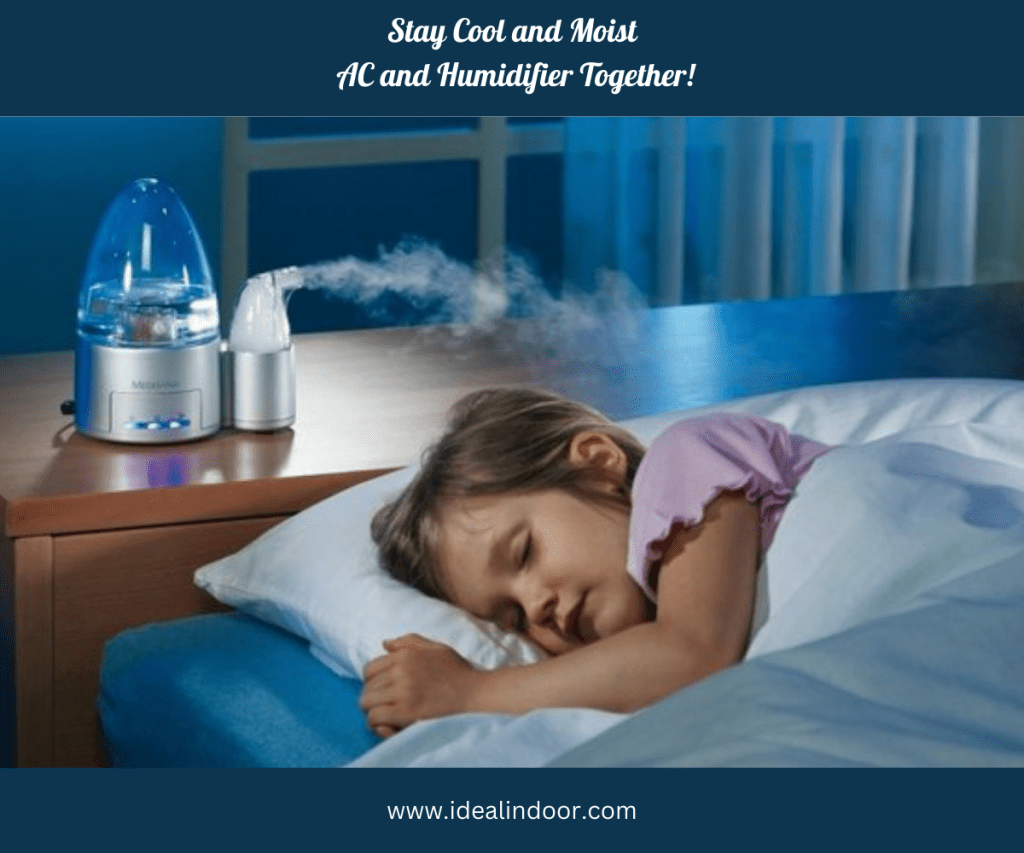If you’ve ever woken up with a dry throat, irritated nasal passages, or a lingering cough, you might have wondered, “Is a humidifier good for my lungs?” The simple answer isn’t as black and white as you might think. Humidifiers are widely used to add moisture to the air, but does that extra humidity help or harm your lungs? Let’s dive into the science, expert opinions, and personal experiences to better understand the role of humidifiers in respiratory health.

What Does a Humidifier Do?
Humidifiers are designed to increase the moisture content in the air, which can be particularly helpful in dry environments. But how does this extra moisture affect our lungs?
Humidifiers work by releasing water vapor into the air to increase humidity. There are various types—cool mist, warm mist, ultrasonic, and evaporative—all of which achieve the same goal in slightly different ways. The choice between them often depends on personal preferences and needs. For instance, cool mist humidifiers are generally recommended for children and people with asthma because they’re safer to use around sensitive groups.
In dry climates or during the winter months when heaters strip moisture from the air, a humidifier can make a big difference in how we feel, especially when it comes to breathing comfort. I’ve personally noticed that whenever I use a humidifier in the winter, I don’t wake up with that annoying, scratchy feeling in my throat. The moisture helps soothe dry airways and makes breathing feel easier.

How Does Humidity Affect Lung Health?
The air we breathe plays a crucial role in our respiratory health, and maintaining the right balance of humidity is key to keeping our lungs functioning properly.
Dry air can irritate the respiratory tract, making it difficult for the body to expel mucus. This leads to congestion, dry throats, and sometimes even nosebleeds. On the flip side, too much humidity can encourage the growth of mold, bacteria, and dust mites, all of which are harmful to lung health.
Dr. Sarah Patel, a pulmonary specialist, says, “Moderate humidity can ease breathing for people with respiratory issues, but too much or too little humidity can cause complications.”
This perfectly sums up the delicate balance needed. If you live in a dry area, using a humidifier might feel like a lifesaver, but going overboard with it can lead to new issues, like mold buildup.
Is a Humidifier Good for Your Lungs?
After battling dry air and constant coughing for weeks, I decided to try a humidifier—and the difference was immediate. The dry cough I had been dealing with for weeks disappeared within days of running the humidifier overnight. It felt like my lungs were finally getting the moisture they needed to stay comfortable.
Studies have shown that using a humidifier can improve lung function, particularly for people with asthma or chronic bronchitis. When the air is too dry, our airways become irritated, making it harder for the lungs to expel mucus. A humidifier helps keep the airways moist, allowing mucus to move freely and reducing the chances of blockages.
However, like everything, moderation is key. Overuse or improper maintenance of a humidifier can create problems. I’ve read about people who, like me, felt immediate relief but later started noticing mold or mildew growth in their home because they weren’t properly cleaning their humidifier. One user shared their experience online, saying, “I noticed that after running my humidifier at night, I woke up without a dry cough for the first time in days. But then, I forgot to clean it for a week and started experiencing sinus congestion again.”

Is It Better to Breathe in Humidity or Dry Air?
The debate between breathing in humid vs. dry air comes down to individual preferences and health conditions. Some people thrive in dry air, while others need humidity to feel comfortable.
If you’ve ever visited a tropical region, you might have noticed how much easier it feels to breathe. This is because humid air can help open airways and loosen mucus, making it easier for your lungs to expel it. However, too much humidity can also promote the growth of allergens like mold and dust mites, which can trigger asthma or allergy symptoms.
Dr. Michael Lee, a respiratory specialist, advises, “While humid air can help loosen mucus and open airways, too much humidity can exacerbate mold and dust mites, triggering respiratory flare-ups.”
That’s why it’s important to keep an eye on indoor humidity levels to ensure you’re not tipping the balance too far in one direction.
What Is the Best Humidity Level for Your Lungs?
Finding the perfect humidity level for your home is essential—not just for comfort, but for keeping your lungs healthy.
The ideal indoor humidity level is generally between 30-50%. Anything below 30% is considered too dry, which can irritate your lungs, while anything above 60% is too humid and can encourage mold growth. A hygrometer, which is a small device you can place in your home to measure humidity, can help you maintain this balance.
Dr. Rachel Kim, a pulmonary specialist, recommends, “Keeping indoor humidity within the 40-50% range helps prevent respiratory problems without encouraging mold or dust mites.”
I followed this advice myself after realizing that my humidifier was running on high every night, pushing the humidity well over 60%. Once I adjusted it, I noticed that I still felt the benefits without any of the drawbacks.
Does Low Humidity Make It Hard to Breathe?
If you’ve ever felt like the air is just too dry to take a deep breath, you’re not alone—low humidity can make breathing difficult, especially in winter.
Low humidity dries out your airways, making it harder for the lungs to expel mucus and causing throat irritation. In severe cases, it can even lead to bronchitis or trigger asthma attacks. I used to wake up in the middle of the night with a scratchy throat and dry nose—turns out, my home’s humidity had dropped below 20%, and it was wreaking havoc on my lungs.
In dry climates, this problem can be even more pronounced. People living in desert regions or places with harsh winters often find that a humidifier makes a world of difference in their breathing comfort. If the air is too dry, it doesn’t just affect your comfort—it impacts your lung health.
The Risks of Using a Humidifier Incorrectly
Although humidifiers can be beneficial, using them incorrectly can introduce new health risks.
If the humidity in your home is too high, it can encourage the growth of mold, bacteria, and dust mites, all of which can lead to respiratory problems. To avoid this, it’s essential to regularly clean your humidifier and keep it running at an appropriate humidity level. It’s also recommended to use distilled water, as tap water can leave mineral deposits that may harbor bacteria.
One user shared their experience, saying, “I didn’t clean my humidifier regularly, and soon after, I started experiencing more congestion instead of relief.” Regular maintenance is crucial if you want to enjoy the benefits of a humidifier without any downsides.
Who Should Use a Humidifier?
If you’re considering whether a humidifier is right for you, it may depend on your specific health needs.
People with respiratory conditions like asthma, COPD, or chronic bronchitis are most likely to benefit from using a humidifier. The added moisture in the air helps loosen mucus and reduces the irritation that dry air can cause. Personally, I found that using a humidifier greatly helped with my allergies and occasional asthma flare-ups.
Dr. Jessica Reed advises, “For patients with asthma, using a cool mist humidifier can make a noticeable difference, especially in dry climates or during winter.” However, if you have certain lung conditions, it’s best to consult with a doctor before incorporating a humidifier into your routine.
Best Humidifier for Lung Health
With so many types of humidifiers on the market, finding the right one for your needs can be overwhelming.
Cool mist humidifiers are generally the best choice for people with respiratory issues, as they are safer and less likely to cause burns (in case of accidents). Warm mist humidifiers, on the other hand, can be helpful in cold climates but may pose a risk if used around small children or pets.
I opted for a cool mist humidifier because it felt less overwhelming in the room, and I found it easier to breathe at night. When choosing a humidifier, consider the size of the room you want to humidify, how easy it is to clean, and whether it includes a built-in hygrometer to monitor humidity levels.
Should You Use a Humidifier for Your Lungs?
After months of using a humidifier, I can confidently say it’s been a game-changer for my breathing, but it’s not without its caveats. The right amount of humidity can significantly improve lung health by reducing irritation and helping your body expel mucus. However, improper use—such as not cleaning your humidifier or allowing humidity to rise too high—can introduce new problems, like mold growth.
For most people, especially those in dry climates or with respiratory issues, a humidifier is a helpful tool. Just be sure to use it responsibly, and consult with a healthcare professional if you have any concerns.